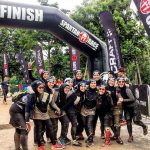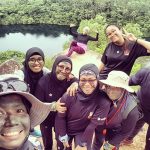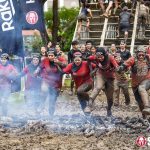“Life at its best is a series of challenges. A big enough challenge will bring out strength and abilities you never knew you had. Take on challenges and you will bring yourself to life.”
Physical Courage is bravery in the face of physical pain, hardship, death or threat of death while moral courage is the ability to act rightly in the face of popular opposition, shame, scandal, discouragement or personal loss.
Mental strength is the ability to regulate your emotions, manage your thoughts and behave in a positive manner despite your circumstances. Developing mental strength is about finding the courage to live according to your values and being bold enough to create your own definition of success. Mental strength involves more than willpower; it requires hard work and commitment. It’s about establishing healthy habits and choosing to devote your time and energy to self-improvement. Although it’s easier to feel mentally strong when life seems simple, often, true mental strength becomes most apparent in the midst of tragedy. Choosing to develop skills that increases your mental strength is the best way to prepare for life’s inevitable obstacles.
Although it’s easier to feel mentally strong when life seems simple, often, true mental strength becomes most apparent in the midst of tragedy.
Developing mental strength is a work in progress. It may even take a lifetime of learning. At times it will seem more difficult than other times. How do the toughest people summon the will to keep going? In the book Resilience: The Science of Mastering Life’s Greatest Challenges, the authors studied resilient people for over 20 years. They spoke with Vietnam prisoner of war, Special Forces instructors and civilian who dealt with terrible experiences like medical problems, abuse and trauma. This is a few pointers of what they learnt…
- Be Optimistic. Truly resilient people who need to survive the harshest situations and still accomplish goals, balance a positive outlook with a realistic view of the world. But what about when your optimism gets tested and things gets scary
- Face your Fears. Neuroscience says there’s only one real way to deal with fear: you need to face it, head on. This is what most resilient people do. When we avoid scary things we become more scared. When you face your fears, they become less frightening. To extinguish a fear-conditioned memory, one must be exposed to the fear-inducing stimulus in a safe environment and this exposure needs to last long enough for the brain to form a new memory which conveys that the fear-conditioned stimulus is no longer dangerous in the present environment.
- Have a Moral Compass. They found that the emotional resilient people all had a strong sense of right and wrong. Despite being in situations that could threaten their lives, they always thought about others, not just themselves. They possessed a keen sense of right and wrong that strengthened them during periods of extreme stress and afterward, as they adjusted to life following trauma. Altruism often stood as a pillar of their value system.
- Practice Spirituality. This was the #1 thing that one researcher found when studying people who overcame tragedy. He found that religious belief among survivors to be the single most powerful force in explaining the tragedy and in explaining survival.
- Social Support. Our brains need social support to function optimally. Connection with others releases oxytocin which calms your mind and reduces stress.
- Have Resilient Role Models. Resilient individuals have role models whose beliefs, attitudes and behaviours inspire them. However, often enough, they have bad role models instead – people who provide an example of what they don’t want to be.
- Maintain Physical Fitness. Those who are resilient believe that staying fit has helped them both during their traumatic ordeal and during their recovery. The stress of exercise helps us adapt to the stress we will feel when life challenges us. Researchers believe that during vigorous exercise, the “anxiety-sensitive” person is forced to tolerate many of the symptoms (rapid heart rate, sweating, rapid breathing) that frighten them during periods of anxiety. Over time, the “anxiety-sensitive” individuals who continues to exercise vigorously can learn that these symptoms of arousal are typically not dangerous and the fear that these symptoms trigger gradually decreases in intensity (Salmon, 2001).
- Keep your Brain Strong. Resilient people are very often lifelong learners. They keep growing their mind, learning to learn and adapting to new information about the world. They continually seek opportunities to become more mentally fit.
“The Brave may not live forever but the cautious do not live at all. For now, you are travelling the road between who you think you are and who you can be”
What is GEMS: Grundy + POPWOW Empower ME Series?
GEMS is a series of fun and easy challenges across different elements, especially tailored to simulate life’s obstacles. GEMS hopes to EMPOWER participants with essential life skills, help to identify and remove any mental obstacles, bring clarity and complete with renewed confidence in themselves and their ability to make decisions and conquer life’s challenges. Participants will learn to enhance their spiritual practice, develop a heightened self-awareness and expand their comfort zone. All they have to do is participate in the activities and collect as many Gems as possible. The more Gems they collect, the more skills they will attain and more confidence garnered. All activities will be conducted as a group to foster social support with command opportunities to develop leadership skills. Don’t worry, no creepy crawlies in included in this series!
- GEMS 1 – Wall Climbing 2018
- GEMS 2 – Nature Walk 2018
- GEMS 3 – Sea Expedition 2018
- Kelong Jump
- GEMS 4 – Spartan Super 2018
- Aroo! Aroo! Aroo!
- GEMS 5 – Nitewalk 2018
- GEMS 6 – Heights Confidence
- Free fall
- GEMS 7 – Land Expedition
- GEMS 8 – Final Challenge Graduation 2018
- GEMS 1 – Wall Climbing Jan Mar 2019
- GEMS 3A – Spartan Sprint April 2019
- Together, we are Stronger
- GEMS 3B – Foerest Force May 2019
GEMS is brought to you by Nashata Active Singapore. Register here : https://shop.nashata.com/en/134-active

















